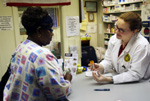Pharmacists in demand because of
shortage
by Diane KnichOf The Post and Courier
Dana Pompey decided to enroll in pharmacy school because she thought the profession would offer the flexibility to do many different types of work.
The fact that pharmacists are in demand because of a national shortage wasn’t a factor in her decision, she said. But as she approaches her graduation from the four-year program at the Medical University of South Carolina, it’s paying off in job and salary offers.
 MUSC pharmacy
student Lauren Burch (right) talks to Bertha Brown about the
prescription Brown is picking up Friday at MUSC Family Medicine.
MUSC pharmacy
student Lauren Burch (right) talks to Bertha Brown about the
prescription Brown is picking up Friday at MUSC Family Medicine. photo by Alan Hawes of The Post & Courier
Pompey, 32, who will graduate in May, landed her first job as a pharmacist for Target in Greenville in early January.
Although the shortage might be good news for students about to hit the job market, it’s making it tougher for drug store operators to manage their businesses, Laura Miller, senior economist for the National Association of Chain Drug Stores, said.
Joe DiPiro, executive dean of the South Carolina College of Pharmacy, said the shortage has boosted pharmacists’ salaries.
“All of our graduates expect to earn more than $100,000 in their first year” of employment, he said.
The South Carolina College of Pharmacy was formed in 2004 when MUSC’s pharmacy school merged with the one at USC in Columbia.
Pharmacy students who graduate this year or in 2009 are considered graduates of the university in which they enrolled. Those graduating after 2009 will be graduates of the South Carolina College of Pharmacy.
Several national drug store chains with stores in the Charleston area referred questions about the pharmacist shortage to the National Association of Chain Drug stores.
Miller said the number of chain drug stores has grown in response to the increased demand for prescription drugs. The demand, she said, is fueled by increased prescription insurance coverage, more new drugs available and an aging population that simply needs more pharmaceuticals.
The number of prescriptions filled by pharmacists at chain drug stores “will continue to go up, up, up,” she predicted.
But there aren’t enough pharmacists available to adequately staff all of those stores, she said.
According to the 2007 data from the association, the pharmacist shortage in South Carolina ranks about “2” on a 1-to-5 scale, which means the state has some shortage, but not a large shortage.
DiPiro said enrollment at the South Carolina College of Pharmacy is up 40 percent from two years ago. Now, 190 students are enrolled. Another enrollment jump isn’t in the works, he said, because officials are still stabilizing the program from the large increase two years ago.
He also noted that today, women make up two-thirds of students in pharmacy school. Many women are attracted to the profession because it offers the option of working flexible hours, DiPiro said.
Flexible schedules, however, might be another factor contributing to the pharmacist shortage, he said.
USC fourth-year pharmacy student Kate Gerrald, 24, said she’s planning to do post-graduate training at Wake Forest University after she graduates. She said that she’s never heard one of her fellow students say they chose to pursue a career in pharmacy because pharmacists are in demand.
But, she said, “we’re all aware we’ll always have a job.”
Editor’s note: The article ran April 21 in The Post and Courier and is reprinted with permission.
Friday, May 2, 2008
Catalyst Online is published weekly,
updated
as needed and improved from time to time by the MUSC Office of Public
Relations
for the faculty, employees and students of the Medical University of
South
Carolina. Catalyst Online editor, Kim Draughn, can be reached at
792-4107
or by email, catalyst@musc.edu. Editorial copy can be submitted to
Catalyst
Online and to The Catalyst in print by fax, 792-6723, or by email to
catalyst@musc.edu. To place an ad in The Catalyst hardcopy, call Island
Publications at 849-1778, ext. 201.